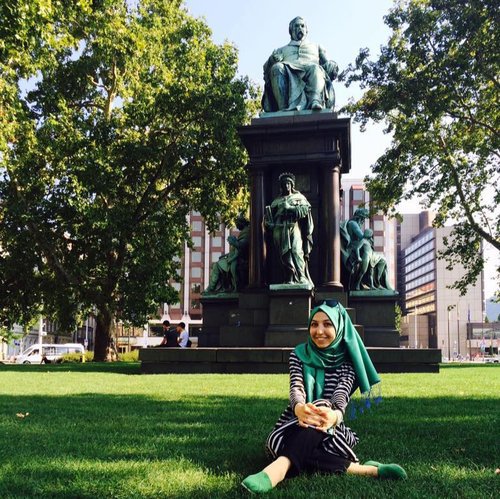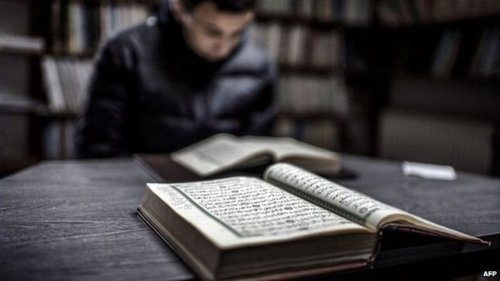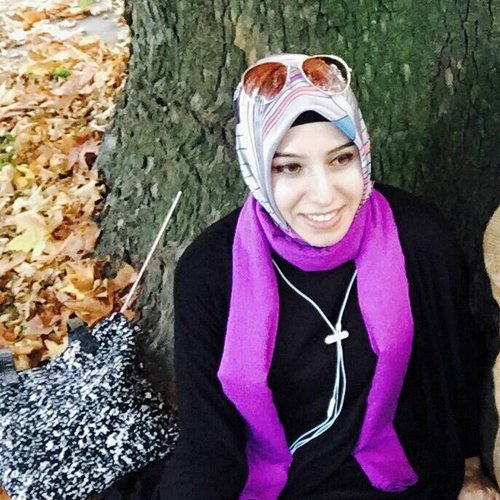Elif and Sema, two Turkish women studying for their Masters at Károli for the semester, sit down to talk with the RCH about their interest in religion and Muslim-Christian relations. These women come from a Muslim background and studied in Budapest in order to gain firsthand experience with Christian communities here as they study various components of religion, both academically and philisophically.
What do you study here, and what research work do you do in Hungary?
Elif: I graduated from faculty of theology in Turkey two years ago and then I began my masters in the History of Islam department and I am still working on my master’s degree now. Here l studied Christian theology. I know that it may seem a bit strange from the outside because I'm a Muslim. I explain it in the following. Although it isn’t in a very detailed way, we have learned general information about Christianity in our Islamic theology faculty. Károli Gaspar University offered me the ability to extend this information. I have also had the opportunity to discuss key issues of Christianity like the trinity, character of Christ, and predestination. In my opinion, this knowledge I have learned here will be very useful in my field for future interdisciplinary studies.
Sema: I have graduated from theology faculty as well. I am doing my MA in philosophy. The reason I’m working on philosophy after theology is that I’m trying to understand our way of thinking about religion, the human universe, morality, society and so on. In the past, some people used philosophy to explain some doctrines of religion and defend them against enemy (pagan or gnostic movement) like Christian church fathers. Now, we should learn philosophy learn about religions in modern times. It is a fact that we need philosohy to grasp some things although the reasons are different. Hence it was important what I learned about Christianity as a religion here. Until now I have learned some things about Christianity in my country and from my own perspective, but it was a good opportunity to hear and try to understand Christianity from people who believe it. I think every student should get this experience. That’s why I came here. Also it is important to understand Christian thought related to my area. Because I wonder why Christianity had such a strong relationship with philosophy in the Middle Ages and why some church fathers tried to explain Christian dogma’s with philosophy. Is Christianity is irrational or not? Is Christianity really based on Platonic philosophy? And so on. I tried to find answers for these questions. Honestly it was a seminal experience for me.

How has your stay here shaped your picture of Christianity?
Elif: Actually, Budapest is the second place who drew the image in my mind of Christianity. My first experience, in terms of an encounter with “the other” was in London three years ago. Although, I think, there was a difference between them. Christianity in Budapest is more traditional than other places and we can say that Christianity is more conservative here. One of most important factors shaping my idea of this is the Christmas celebrations. Preparations which began a month before show that there is not only the entertainment side of the celebration but also the religious aspects as well. Apart from this, we have two chances to participate in Sunday ceremonies in Hungary. One of them is at a Scottish Church, because it is the only place that has religious ceremonies in English. The other church is in the town of Veszprem. We went to there at the invitation of our teacher. Actually, the ceremony in Veszprem is more different than others in terms of spirituality and involved section because the majority of the community consists of young people. Moreover, I have participated in the communion ceremony at this church for the first time in my life. Another factor is my friends who I met in school and at different places. The means of recognizing a human is not only his/her personality also her religion. In this respect, a lot of practical experience was more beneficial for me than theoretical knowledge.
Sema: Before I came here, there was a picture or Christian profile in my mind. This picture became clearer. I learned about Christianity as a religion and about Christian people from books but it was a good opportunity to face and live with them in order to understand how legitimate their beliefs are. They represent well their religion and values. I think every theology student should try this experience. Living together teaches more things than books. In this experience, I recognized that emphasizing our differences is important. (For example, all of us believe in a divine, being but it is a clear fact that Christian’s God and Allah are not the same.) It does not mean that we empahisize our difference to eliminate each other. It means that we are defining ourselves and others because our differences make us who we are.
What is your personal experience of the Hungarian culture and Christianity as a religion?
Elif: We lived in the center of Budapest for five months, and we are studying the theology faculty. This means we get to know the culture and religion as much as possible. Our neighbors and friends at school were the biggest opportunity in gaining this experience. As we know, the Ottoman Empire has an important place in the history of Hungary. Cultural interactions which were brought about by living together can be seen even today. For example, names of Hungarian people. I was surprised to see that Zoltan is many people's first name. There are some narrations about Gulyás soup that is one of the traditional dishes of Hungary indicating that it passes through the Ottoman culture. These examples show the closeness between the two cultures also. Otherwise; if I am to touch upon my personal experience in daily life, as far as I generally observe, most Hungarian people are helpful. Unfortunately I can not say the same thing for all of them, especially officials who work in government departments who behave quite uninterested in us. I do not know exactly why they behave like that, maybe because we're tourists and Muslims and they don’t care so much for that. I have experienced this many times and it really created a bad image in my mind.

There have been recently several terrorist attacks in Turkey. How do you feel about these? Do you experience any mistrust towards Muslims due to these atrocities – more specifically due to terrorist acts of IS and other terrorist organizations?
Sema: We are very upset for the terorrist attacaks not only in Turkey but also all over the world. Terror must be condemned in every aspect and everywhere, because terror has no religion, nationality, language. Hence I think it is wrong that teorrist attacks are associated with a particular religion. Those who perform these attacks may be Muslim but it does not mean that every Muslim is a potential terrorist. Let me explain with an example.
I had a bad experience just the day after Istanbul’s bomb event. While I was walking on Andrassy street, someone came to me and said, “You can not wear headscarf here because this is Europe not Afganistan. If you want to wear it, go home” and then he shouted “Terorrist!” at me. I was so suprised because I have never faced a situation like this. But I am aware that this man does not represent Christianity or Hungarians for me. Because I met some people who are really tolerant and open-minded in the university. So I don’t blame all Christian people and Christianity as a religion because of this man. Because everyone knows and admit this fact that people tend to do evils. However, it does not mean that these evils come from their beliefs or religions. Therefore I personally think that we should not accuse religions. Actions are individual. My experience is limited to just that man, and I do not think that it applies to every person who lives in Europe. So, I am expecting that people don’t blame me for my religion and all Muslim because of some Muslim’s actions. Some people who claim to be Muslim do some actions which are not suitable in terms of Islamıc understanding. But these actions don’t make me mistrust Islam or Muslims, because I look to Islamıc sources, not Muslim’s actions, in order to understand what is the real Islam and Muslim.The Kuran shows us transparently how to be a Muslim. If I want to understand Christianity, I look at the Bible firstly, not people. Because I know that people are weak and falliable. So I don’t criticise their religion but I criticise people and their actions.
Moreover there is something which I want to say, which is that when a Muslim does something wrongly, most people tend to attach this action to his/her religion. However the same situation is not the case for other religions or beliefs. For instance, a man named Craig Stephen Hicks killed three Muslim young people in their home last year in the USA and nobody blamed him because of his religion. If a Muslim had done this, most likely most people would have blamed his religion for this, not him. It causes the rise of Islamophobia in the West. Islam is perfect but Muslims are not. If a Muslim makes a mistake, blame him, not his religion.
Have you had any direct experience or impact deriving from the constant flow of refugees that first reached Europe through Hungary last summer/autumn? What is your insight? Some question whether they are real refugees, others simply helped them...
Sema: We saw them for the first time at the Keleti Palyaudvar metro station while they were sleeping. We were so surprised and asked someone why they live here. If they are refugees, why doesn’t the goverment protect and help them? He said, “They are refugee but they don’t want to stay in Hungary. The one thing which they want is to get to Germany or other European countries by train. But they are not allowed to leave on the trains yet, that’s why they live in here.”
As to my insight about them and whether they are real refugee or not, I must say that I heard this claim many times and from many people. It seems to me that this claim can lead to some bad behaviors against them in Europe. What should these people do? Wait to die or to choose to survive? I personally think that we as believers bear tremendous responsibility for them. They can be a way which leads to good deeds for us if we able to notice this. When I talk with my friends or other people about the refugee crisis, they generally draw attention to the political aspects. But I think what is important is that we have individual and ethical responsibility for them. Politicial aspects should not hinder us from helping a real refugee. We can not give up our responsibilities.
A couple of days ago, Alain Touraine made an interview in a Turkish newspaper(Radikal) and he said the following sentences; “I saw police officers beating migrants to put on the bus in Paris but the same day 200 immigrants on the edge of the Seine were helped by a large number of volunteers. So the government is being too poor for immigrants, and people are very good.” These sentences say pretty important things for us. We as people should protect the people who need help. It is a task that must be solved by states if they are real refugee or not. We should not abandon them because of this claim. Things we can do on an individual basis are different. And things which should be done in the political area are different. If we believe we have fulfilled our responsibility individually and collectively towards refugees in humanitarian or moral sense in the four corners of the world, we can be peaceful. I think the answer is within us. Here is the important question: How many people in the world will take this ethical and humanitarian responsibility for refugees?

Do you think Muslim and Christian culture can exist next to each other? Why?
Elif: I do not think it has had a drawback. According to my belief, everyone is free to believe their religion of choice and worship according to this faith. Because Islam has the principle as follows: "There is no compulsion in religion."
In fact this is never a foreign matter to our history. The Ottomans took human rights and freedoms into account under the sovereignty of nations and communities. Muslims and non-Muslim elements could live in a certain order in the Empire. The reason of tolerance for the non-Muslim community is directly related with the outstanding features of Islam.
In my opinion, these examples can be arranged for present and future humanity. The most essential thing for establishing this system is aframework of respect. If this can be achieved, Muslim and Christian culture can exist next to each other.
What can lead to atrocities in civilian life? How do you think Christians should behave with Muslims - and the other way round?
Sema: It seems to me that the reason of what leads to atrocities in civilian life is getting away from our ethical and religious values. Most of us are individualized. As a result of this, we lost a sense of community. Conscientiousness and ethic responsibility are declining day by day. Nobody cares for each other anymore. If people do not have any divine goal, why should they care about others? Why should they behave ethically to others? Here is what secularization brings us. It does not mean that all religious people are ethical. Today most religious people don’t behave ethically. Our beliefs should lead to good actions but they do not. This is a big paradox which we need to think about. But my point is that if you break your divine connection or do not have any purpose of your life, you can easily tend to these atrocities even if you live in a civiliyed society. People and society became modern but at the same time people get away from ethical aspects. Living in modern or civil society does not lead to virtue.
Rousseau, one of most important philosophers who presented early critisism of modern/civil life, drew attention to this matter saying that the arts and sciences have not been benefical to humankind. Because knowledge has no positive contribution to the virtue, he explains it as: "We have great physicists, mathematicians, chemists, astronomers, poets, but we have no ethical and dear people anymore”. In this context what I want to say is that everyone needs to think about the following question: How come we got here? We as believers need to think about it. People who believe in a divine being know that life has a theological meaning. They also know that everything, including human acts, have a certain purpose in this universe. Hence they should be aware of their responsibilities and aims. If a Muslim or Christian person is aware of that and they live and act in accordance with this purpose and don’t behave to one another like an enemy or someone who needs to be eliminated, the world will become better than it is now.
Source: Parókia.hu